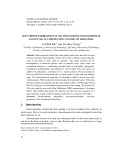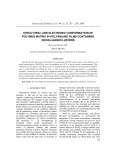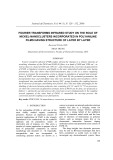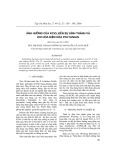
Polyaniline Films
-
In this study, TiO2 was used as an additive for polyaniline, considered to be a matrix polymer. The nanocomposite film was fabricated electrochemically on metal surfaces (mild steel and stainless steel). The electrochemical properties of polyaniline could be seen on the cyclic voltammogram.
 8p
8p  tamynhan8
tamynhan8
 04-11-2020
04-11-2020
 10
10
 2
2
 Download
Download
-
Structural and electronic transitions in polyaniline (PANI) matrix due to the presence of nickel-nanoclusters (PANI-Ni) were investigated via UV-Vis spectroscopic measurements. The obtained results indicate that there exist two populous packets of polaron (located at 872 and 973 nm) in both PANI and PANI-Ni.
 4p
4p  uocvong04
uocvong04
 24-09-2015
24-09-2015
 31
31
 2
2
 Download
Download
-
Fourier transform infrared (FTIR) studies showed the changes in a relative intensity of stretching vibrations of the PANI and PANI-Ni films, in a band of 1480 and 1590 cm-1 , as well as those in a band of 1200 and 1350 cm-1 , and evidenced the conversion of quinoid form of PANI to bipolaron structure, and finally to the more delocalized polaronic sites during protonation. This also shows that nickel-nanoclusters play a role as a source supplying protons to promote the protonation, giving a change in population of quinoid and aromatic forms of PANI, and increasing a number of NH bond.
 6p
6p  uocvong02
uocvong02
 24-09-2015
24-09-2015
 71
71
 3
3
 Download
Download
-
Polyaniline has been electrochemically formed on stainless steel in sulphuric acid 0.5 N with and without KClO3. The CV spectrum style and the peak characteristic parameters, as peak potential Ep, peak current Jp, peak charges quantity Qp, then have been analyzed under a consideration of the effect of KClO3. The resistance of the PANi films was studied using electrochemical impedance measurement. It has been found that KClO3 has affected the PANi morphology much more than the CV spectrum.
 6p
6p  uocvong01
uocvong01
 24-09-2015
24-09-2015
 36
36
 3
3
 Download
Download
CHỦ ĐỀ BẠN MUỐN TÌM
















